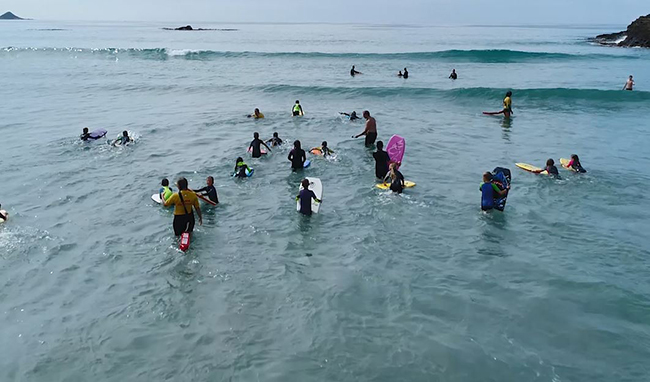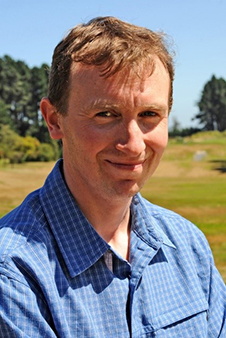 Tuesday 12 February 2019 1:32pm
Tuesday 12 February 2019 1:32pm
Children take part in one of the skills sessions at Brighton Beach, Dunedin.
Despite the majority of drownings occurring in open-water, basic aquatic skills are typically taught in swimming pools.
To address this disparity, a University of Otago study set out to determine the effectiveness of teaching children basic survival skills in lakes, rivers and the sea.
Study lead, Professor Chris Button of the Otago's School of Physical Education, Sport and Exercise Sciences, says the study was encouraging and proved the efficacy of such an initiative.
“Given all the different open water environments that exist in New Zealand this research is so important here. As an island-nation, we must consider carefully how to best educate people about the different types of aquatic environments that surround us.
“There seems to be a generally held assumption that learning to swim in a pool is sufficient to drown-proof children, however, we think this is misleading.
“The positive message from this study is that it is possible to teach kiwi children some fundamental survival skills and core knowledge that may allow them to safely recreate in New Zealand's beautiful and abundant waterways,” he says.
The study, supported by Water Safety New Zealand (WSNZ), saw 120 children aged between 7 and 11 from around Dunedin undertaking a three-day water safety and survival skill programme in real-world, open-water environments including beaches, harbours and rivers.
Their water safety knowledge and skills were tested in a swimming pool before, immediately after, and three months after taking part in the programme.
The tasks they were assessed on included a quiz, buoyancy, submersion, obstacle course, simulated rescue and propulsion.
In a report submitted to WSNZ, the researchers say less than 50 per cent of children achieved a high level of competence in the pre-test.

Professor Chris Button.
“The study confirmed that the water safety knowledge and skills of New Zealand children was varied, but overall quite low in terms of competency skills recommended by Water Safety New Zealand,” Professor Button says.
However, throughout the programme, the children improved their competency in each of the six tasks and he was “genuinely surprised” by the level of skill retention demonstrated at the three-month follow-up.
“Even three months after the open-water programme, children were still able to recall key water safety facts and many potentially life-saving skills like treading water, fitting a lifejacket, and swimming in their clothes. This was a very reassuring result and to our knowledge the first of its kind in the water safety literature,” he says.
Previous work carried out by Professor Button has shown 10 weeks of one-hour lessons taught in swimming pools was effective at improving water safety knowledge and competency, this current study indicates similar levels of improvement can be obtained from a three-day programme.
Feedback received from parents and caregivers was “extremely positive” and many commented they wished a similar program was available on a regular basis, he says.
WSNZ supports the initiative as it recognises the potential value for its national Water Skills for Life programme. CEO Jonty Mills says it illustrates the “untapped potential” of teaching children water safety skills in a natural environment.
“We would like to see Water Skills for Life taught in every New Zealand primary school and being able to maximise the use of natural resources could help with access to aquatic education.
“The results around the retention of taught knowledge indicates there may be additional benefits to teaching in these environments, as well as being enjoyable and fun, which is what Water Skills for Life is all about.
“Aquatic education needs to prepare our children for life in New Zealand. Any opportunity to give them experience in open water in a safe and controlled way is a massive positive for any child's development,” he says.
Subject to funding, Professor Button says a follow-up study will be conducted next summer to understand how people transfer skills learnt in one environment, into another.
They are also working with Māori researchers at Otago's School of Physical Education, Sport and Exercise Sciences to see if a similar program based upon traditional Māori practices and rituals around water is effective.
The researchers wish to thank the education providers in the programme who helped create an effective, yet safe, learning platform – Surf Life Saving NZ, Wild Earth, Swimsation, Coastguard Boating, and Swimming New Zealand – along with all the children and their parents and caregivers who took part.
International Symposium Active Living and Environment: Linking Transport, Health and Environment:
Professor Button will present the findings of this study at the International Symposium Active Living and Environment: Linking Transport, Health and Environment, which runs from 13 to 15 February at the University of Otago.
Video footage:
The University of Otago has high-quality drone and go-pro footage of one of the skills sessions held at Brighton Beach, Dunedin, available on request.
For more information, contact:
Professor Chris Button
School of Physical Education, Sport and Exercise Sciences
University of Otago
Email chris.button@otago.ac.nz
OR
Ben Christie
Senior Communications and Media Advisor
Water Safety New Zealand
Email ben@watersafety.org.nz
Find an Otago expert
Use our Media Expertise Database to find an Otago researcher for media comment.
